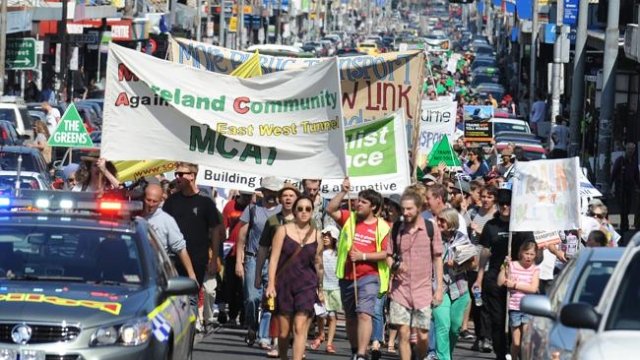
The campaign against Melbourne's East West Tunnel received a boost when about 1500 residents and members of community groups rallied in Brunswick on March 30. The rally sent a strong message to the Denis Napthine government that the project should be scrapped and the money be spent on expanding Melbourne’s public transport system.
The rally was organised by Moreland Community Against the East West Tunnel (MCAT), a grassroots community organisation supported by the council.
The planned 4.4 kilometre tunnel, linking Hoddle Street to the Citylink at Parkville, is the first stage of a projected 18 kilometres of new toll roads. These are meant to reduce the congestion on the Eastern Freeway and better link the eastern and western suburbs.
Over the past year, a campaign of rallies, public meetings and pickets of worksites has helped turn the tide of public opinion against the project. This activity has mainly occurred in the inner-city Yarra municipality, with activists around Doncaster also demanding a rail link to that area as an alternative to the tunnel project.
The campaign has helped convince many people that congestion will not be relieved, that homes in Hoddle Street, Alexandria Parade, Moonee Valley and Flemington will be unnecessarily destroyed, and up to $15 billion of public money that could be used to revitalise public transport will be wasted.
A poll, reported in the Age on March 2, found that only 24% of Victorians think the East West Tunnel is the infrastructure project that should be given the highest priority by the government, compared with 42% who nominated the Metro rail upgrade project.
But powerful forces are in favour of it: big construction, road freight and other corporate interests — and politicians and mass media outlets who serve big business.
But public opinion against the project is growing and may prove more powerful. The four councils the tunnel will pass through — Melbourne, Moonee Valley, Moreland and Yarra — do not support the project.
Last August, Moreland council sent a letter to the Minister of Roads, Terry Mulder, opposing the East West Link. Moreland councillor and Socialist Alliance member Sue Bolton moved that the council needed to organise a public meeting and the council allocated $40,000 to a “trains not toll roads” community campaign.
More than 150 people attended the public meeting last November. After this, Bolton organised a founding meeting to set up MCAT.
MCAT mobilised dozens of activists who helped publicise the March 30 rally and 50,000 leaflets were letterboxed or handed out on the streets.
Green Left Weekly spoke with some of the rally-goers. Joe Edmonds, a Parkville resident of 13 years, suggested that adding another toll road would only increase the gridlock on Melbourne roads. “If you use the M1 today, which is the extension of City Link through to the eastern suburbs, you’ll see that it’s at a standstill in peak hour, so we think [the East-West Link] will be the same,” Edmonds said.
MCAT’s Michael Petit said Melbourne Zoo would be forced to relocate or close altogether, something that both big political parties and the media have been silent about. The plans for the tunnel indicate that two exit ramps would be within 40 metres of endangered species habitats at the zoo.
The tunnel will threaten green spaces, as more than 5000 trees are to be cut down to make way for the tunnel, and the few areas of parkland in the inner north will be reduced even further. As Paul Sinclair, convener of the Community Sports Alliance, told the crowd: “All the East West tunnel will do is make people fatter, slower and lonelier.”
Nancy Atkin of the Brunswick Residents Network indicated that the tunnel would worsen the problem of rising car use on roads, which previously had high levels of foot traffic and bike commuters. In a survey of 400 Brunswick households conducted by the Brunswick Residents Network, almost 90% had reported dangerous driving in their streets. Sixty percent of residents in one Brunswick street had witnessed an accident in their street.
The rally is one way to galvanise public opinion against the project. Another tactic is community pickets that have physically stopped or delayed test drilling. Mel Gregson, of the Yarra-based Tunnel Picket, told GLW the pickets began six months ago as a group of “ordinary people coming together and taking action”. The picket had not only held back the government’s schedule and successfully halted some of the preliminary test drilling, but was pivotal in turning public opinion against the tunnel. Gregson highlighted that there is now “a huge question mark over whether the tunnel will be built”.
Bolton told the rally: “This tunnel will have an impact on people all over Victoria. The $8-15 billion needed to fund the tunnel would be pulled from health and education budgets, and it means no new major public transport infrastructure for a generation or more.
It is clear that a united campaign of mass protest across Melbourne could mobilise thousands.
MCAT plans to continue building community opposition. It aims to make the November state elections a referendum on the tunnel. It demands that every candidate and party in the election commit to scrap the tunnel and rip up the contracts, and to use public money to invest in public transport, not toll roads.
Several anti-tunnel actions are planned for the next few months. Tunnel Picket's “campaign caravan” will tour the suburbs, beginning with Doncaster on April 5. MCAT has called a “children’s march for the animals” on May 4 aiming to draw attention to the impact of the tunnel on Melbourne Zoo, and is seeking support from school councils.
A citywide rally is scheduled for June 28 as a culmination of the campaign caravan. Tunnel Picket, MCAT, Public Transport Not Traffic and the Greens are supporting the rally.